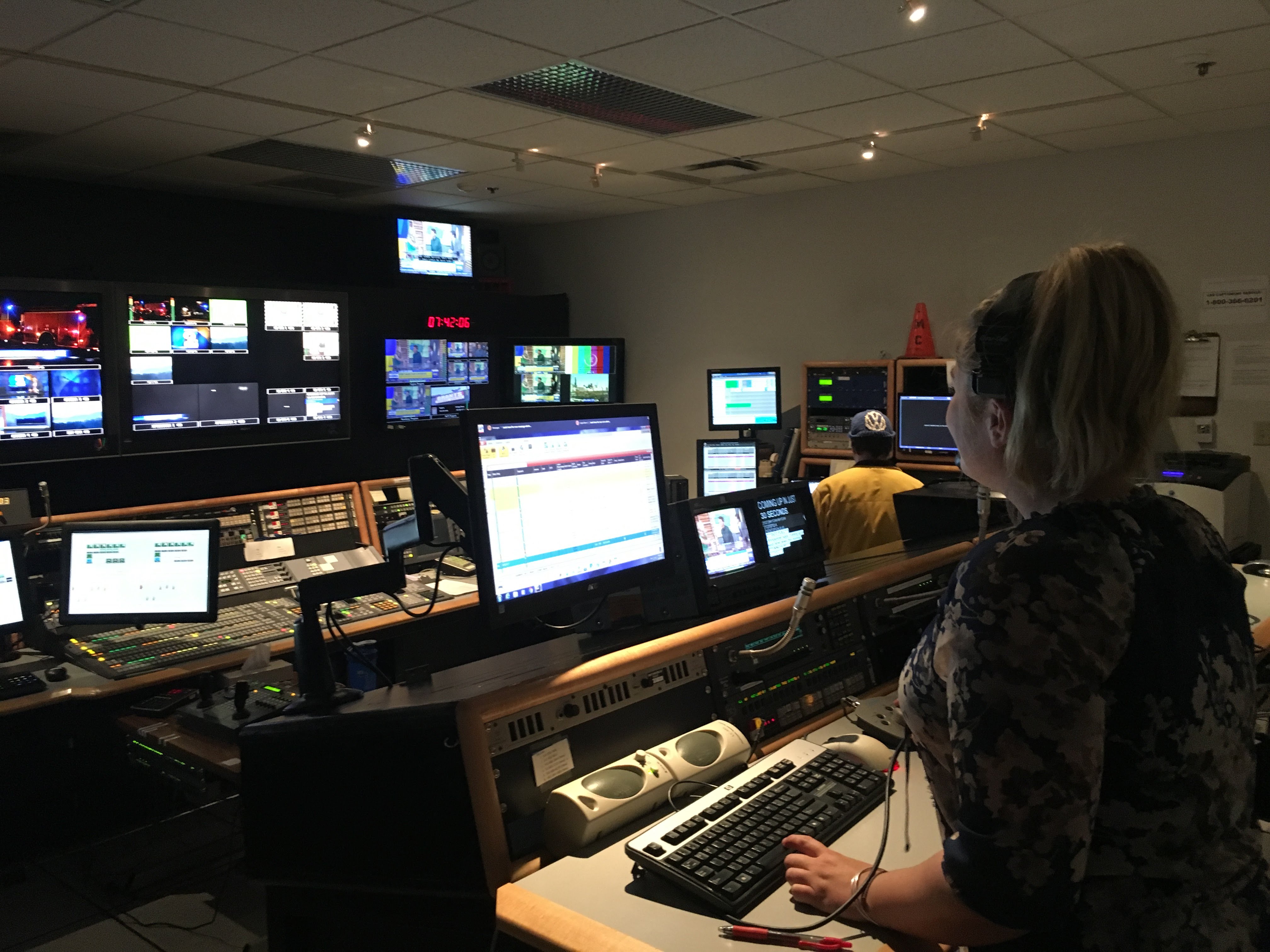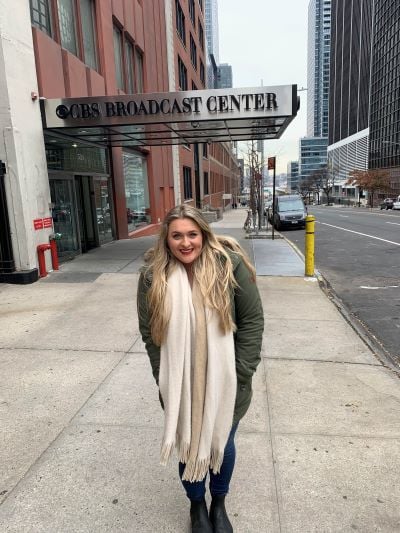
Danielle stands outside the CBS Broadcast Center in New York City.
The Inside Scoop: Danielle Austen, BA '16 (journalism), shares her journey from Duck TV to "48 Hours" in an interview with Megan McKinney, associate director of the Duck Career Network
Can you describe your journey from studying broadcast journalism at the UO to becoming an associate producer of development at "48 Hours?"
Two weeks before my graduation from the UO, I told my professor and mentor, Rebecca Force, that I planned to take the summer off. I had interned every summer throughout college and just wanted a break. But Rebecca had other ideas. She mentioned that KEZI, the ABC-affiliate station in Eugene, was looking for a morning producer and thought I’d be perfect for the role. When I realized she was right (as usual), I applied—and got the job!
Two days after graduating from the UO, I started an overnight shift at KEZI 9 News, working from 10 p.m. to 7 a.m. I had some experience with overnight shifts from my internships, but it was still a shock. Producing the 5 a.m. show with just one other producer, fellow Duck TV alumnus, Ronald Clark, I learned many important skills, especially writing. I expressed my interest in on-air reporting to our news director, and eventually, I became an on air reporter, while also becoming the weekend producer. KEZI 9 News provided instrumental experience for me that has positively impacted my entire career.
A significant change came when, at age 24, I made a jump to the East Coast with my now husband. While still passionate about journalism, I briefly worked at an animal hospital but found myself yearning to return to the newsroom, especially during the Brett Kavanaugh hearings. That realization pushed me to re-enter the field.
We were living in the Washington D.C. area, and I applied to local stations and the CBS News Associates program, an 18-month entry-level program that allowed me to rotate shows every five months. Typically, participants don’t stay the entire length of the program because they get hired before it ends, which happened to me. It was the perfect way to get my foot in the door. CBS was impressed with me, but given D.C.’s political focus, they suggested I’d thrive better in New York City.
During my interview in New York, the interviewer asked if I was familiar with the investigative true crime television program, “48 Hours”. I had always been a fan. The interviewer led me to the “48 Hours” office for a last-minute interview. At that time, Susan Zirinsky, who later became the CBS News president, was the executive producer. We hit it off, and I started as a “48 Hours” news associate. I was working at the same broadcast center where the highly respected journalist Walter Cronkite once reported the news. The building is full of history, stories, and some of the best journalists I’ve ever been blessed to work with.
With my local news background, I thrived during breaking news situations, but I have also learned to love long-form journalism as well. After five months, I transferred to CBS This Morning, working overnight from midnight to 10 a.m. The fast-paced, live-show environment on a national level was an intense learning experience. Working well as a team was key, especially in breaking news situations. I gained a mentor who helped me refine my producing skills, leading me to produce segments for the “Saturday Morning News.”
Eventually, I returned to “48 Hours,” this time as a full-time associate producer.
Danielle in the KEZI 9 News production studio.
What does your day-to-day look like at “48 Hours”?
As an associate producer of development, I’m part of the team that follows breaking news, finds news stories, facilitates interviews, and develops relationships with people involved. I start my days reading multiple newspapers and seeing which true crime stories people are talking about online. I spend a lot of time traveling around the country, attending hearings and murder trials. One of the most important roles I have is speaking with family and friends of victims and suspects, and building a foundation of trust with them. My role involves really listening to people and ensuring their loved ones’ stories are told respectfully and accurately.
Can you share a significant challenge you faced in those roles, and how you overcame it?
There have been many challenges in my career, but a few stick out. As a young professional right out of college, producing a live show in a control room was an incredible learning experience, but it was challenging. I often ran the teleprompter while producing, ensuring the show was timed to the second. Knowing when to cut or shorten a story within seconds was essential. I learned along the way that my small morning team was always ready to help and teach me.
During the pandemic, every journalist entered a new world and way of reporting. Every courthouse in America shut down and the court system essentially came to a halt. All of the stories we were working on at “48 Hours” were now not going to trial before our next season and we needed to rethink how we were able to do our jobs. We decided to look back at older cases that had already been tried and filmed. I pitched a story about Christy Martin, a retired boxer whose husband brutally attacked her in 2010. Christy survived, and it was an honor to tell her story of strength and resilience ten years later.
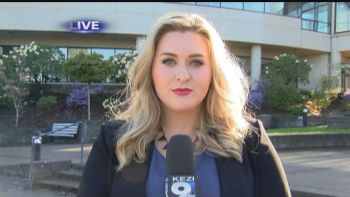
Danielle reporting for KEZI 9 News in Eugene, OR.
As someone who has worked extensively in broadcast journalism and production, what skills do you believe are essential for success in this field?
The ability to wear multiple hats is crucial. Journalism today is very different than in the past. As a reporter, you need to know a bit about everything—shooting, editing, and most importantly, writing.
When I was a reporter, I needed to pitch 3 to 5 stories each morning to our leadership staff. Once a story was approved, I would make calls, conduct interviews, shoot video, edit footage, and create a package for the newscast. Then, I’d rush to the location of my live shot. Sometimes, I had a cameraman; other times, I was on my own.
Adaptability is key, and I credit my former student experience at Duck TV for preparing me. At Duck TV, we worked in small teams on stories, learning to shoot, edit, and write in the correct format. This experience gave me confidence in my first industry job, and I encourage UO students to participate in extracurriculars and internships that set them up for future career success. These experiences help you determine if this is the right industry for you. My internships were invaluable, exposing me to real-time reporting and breaking news situations.
Networking is crucial in journalism. Go to networking events and make connections. Many journalists are willing to mentor young people, and finding a mentor was key for me. These connections can help introduce you to the right people. However, while connections can help open the door, passion for journalism will take you where you want to go.
Passion for storytelling and a commitment to ethics are vital. Journalism is under intense scrutiny, and maintaining high ethical standards is essential. A quote I first heard at the SOJC still resonates with me: “News is something which somebody wants suppressed; all the rest is advertising.” Journalism is about truth-telling, and it’s crucial to hold people accountable.
Finally, don’t underestimate the importance of academic advising. I met with my advisor every term to stay on track for graduation.
Looking back at your time at the UO, how did your education and involvement with student activities like Duck TV shape your career?
I’m still close with many of my Duck TV peers. Duck TV has been crucial to my career and confidence in what I do. I started as a student reporter in my freshman year and worked my way up to executive producer of news and sports by senior year.
Duck TV taught me leadership and prepared me for working in live news. We filmed as if it was live, with no room for mistakes. This experience was invaluable when I started in local news. Although I initially aimed to be a reporter, the producing skills I developed made me a better journalist.
Duck TV was a significant part of my college experience, and I wouldn’t change a thing. It’s an amazing program that played a key role in shaping my career.
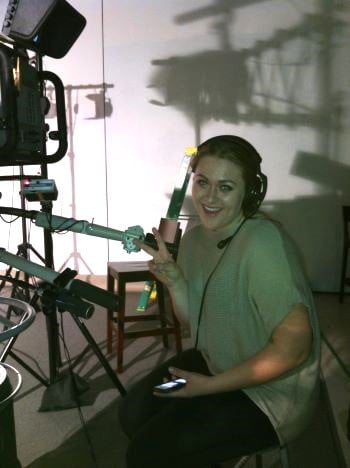
Danielle as a student working at Duck TV.
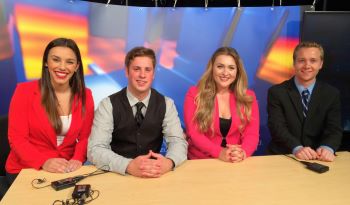
Danielle and fellow UO students anchoring at Duck TV.


